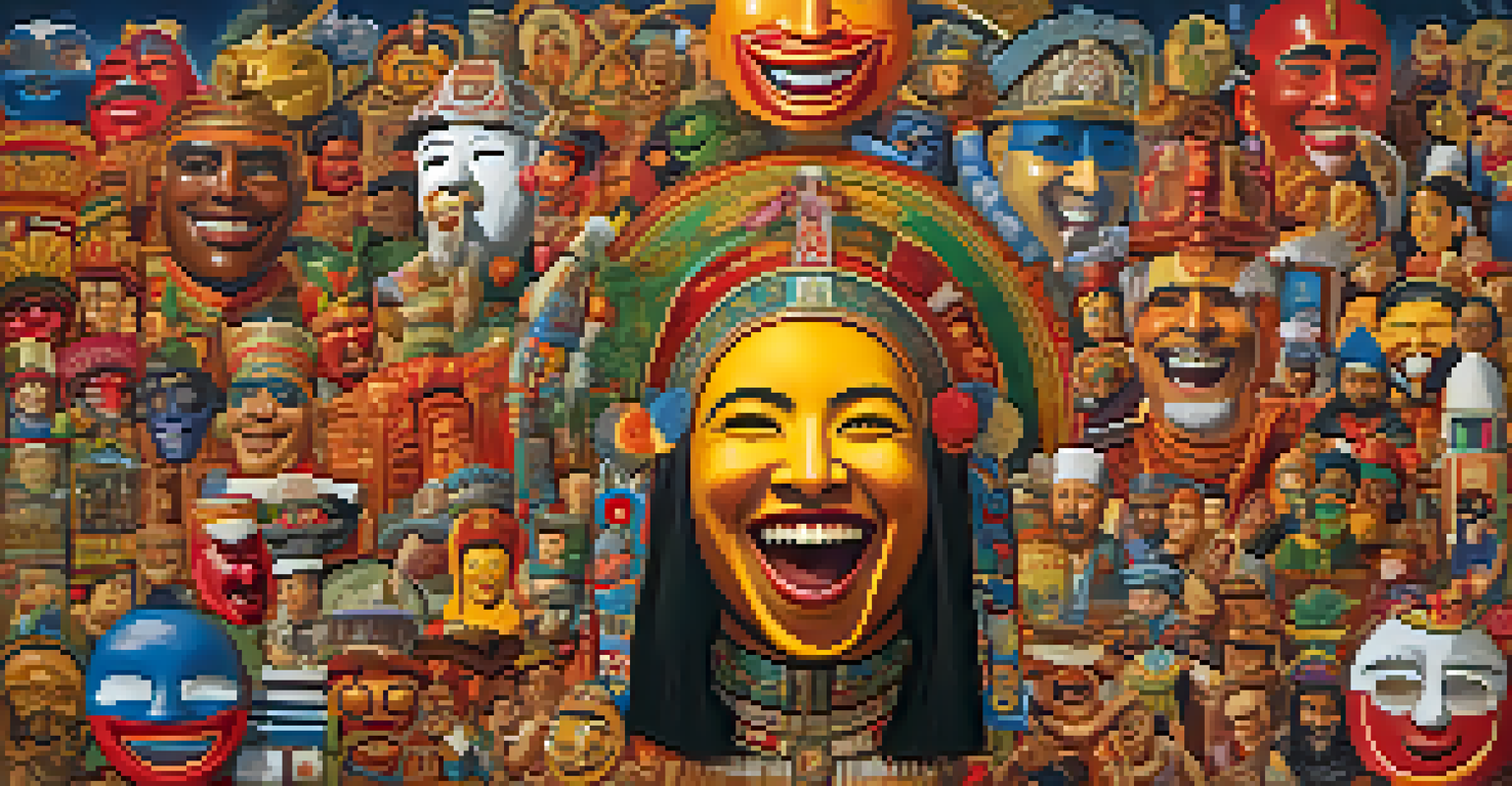The Role of Comedy: Laughter as a Psychological Mechanism

The Science Behind Laughter: What Happens in Our Brains
Laughter is more than just a response to humor; it's a complex psychological reaction that engages various parts of our brain. When we laugh, our brain releases endorphins, which are chemicals that promote feelings of happiness and reduce stress. This biochemical process highlights how laughter serves as a natural mood booster, helping us cope with the challenges of daily life.
Laughter is the shortest distance between two people.
Additionally, laughter activates the brain's reward system, similar to how we respond to food or money. This connection explains why we often seek out humorous content, whether in movies, stand-up routines, or social media. It's a delightful reminder that sometimes, all we need is a good laugh to feel better.
The interplay of laughter and brain chemistry also suggests that comedy isn't just for entertainment; it's an essential part of our mental health toolkit. By understanding the science behind laughter, we can appreciate its role in creating joy and fostering resilience.
Laughter as a Stress Reliever: Finding Relief Through Humor
In times of stress, laughter acts as a powerful antidote, providing a momentary escape from our worries. When we laugh, our body relaxes, tension dissipates, and we momentarily forget our troubles. This natural form of relief can be especially beneficial in high-pressure situations, where a good joke or witty remark can lighten the mood.

Moreover, laughter can improve our perspective, helping us view our challenges with a lighter heart. It encourages us to step back and recognize the absurdity of certain situations, making them seem less daunting. This shift in mindset can lead to better problem-solving and decision-making.
Laughter Boosts Mental Health
Laughter releases endorphins and activates the brain's reward system, serving as a natural mood booster and essential for mental well-being.
In essence, laughter serves as a coping mechanism that allows us to navigate life's ups and downs with a sense of humor. Embracing this lighthearted approach can transform our experiences, turning stress into manageable moments of joy.
The Social Aspect of Laughter: Bonding Through Humor
Laughter is inherently social, often acting as a bridge that connects individuals. When we share a laugh with someone, it creates a feeling of camaraderie and strengthens our relationships. This social bonding is crucial, as it fosters a sense of belonging and community, which are essential for our emotional well-being.
Humor is mankind's greatest blessing.
Think about those moments when you and your friends share a funny story or joke; it’s not just the humor that makes you feel good, but the connection that laughter creates. This shared experience builds trust and intimacy, allowing us to communicate more openly and authentically.
In a world that can often feel isolating, laughter brings people together, reminding us that we’re not alone in our struggles. The shared joy of a good laugh can be a powerful tool for building friendships and enhancing our social networks.
Comedy as a Tool for Coping: Dealing with Difficult Times
Comedy has long been used as a coping mechanism during challenging times. From comedians who tackle serious issues through humor to films that blend tragedy with comedy, the ability to find laughter in adversity can be incredibly healing. This approach helps us process our emotions and confront difficult subjects in a more approachable way.
For instance, many people turn to comedy during tough life events, such as loss or illness. By finding humor in these situations, we can begin to make sense of the chaos around us and regain a sense of control. This ability to laugh amidst hardship is a testament to the resilience of the human spirit.
Laughter Strengthens Social Bonds
Sharing laughter fosters connection and camaraderie, enhancing relationships and creating a sense of belonging within communities.
Ultimately, comedy serves as a reminder that even in our darkest moments, there is still light to be found. Embracing humor allows us to navigate life's challenges with grace and a smile.
The Therapeutic Benefits of Laughter: Healing Through Humor
Laughter therapy, a growing field in mental health, harnesses the power of humor to promote healing and well-being. Therapists often integrate laughter exercises into their sessions to help clients release pent-up emotions and reduce anxiety. This unique approach can lead to breakthroughs that traditional therapy methods may not achieve.
Research has shown that laughter can lower blood pressure, boost the immune system, and enhance overall mood. These physical benefits complement the emotional relief that laughter provides, creating a holistic approach to mental health. It’s fascinating how something as simple as laughter can have profound effects on our bodies and minds.
By recognizing laughter as a therapeutic tool, we can encourage its inclusion in our daily lives. Whether through watching funny movies or participating in laughter yoga, integrating humor into our routine can lead to improved mental and physical health.
Cultural Perspectives on Humor: Diverse Interpretations of Laughter
Humor varies widely across cultures, reflecting diverse values, norms, and social dynamics. What one culture finds hilarious, another may not understand at all. This cultural lens on comedy highlights how laughter serves as a mirror, reflecting societal beliefs and attitudes while also challenging norms.
For example, satire is a common comedic form that critiques societal issues, often sparking important conversations. Comedians around the world use humor to address topics like politics, identity, and social justice, making audiences reflect on their beliefs while also providing a good laugh. This interplay between comedy and culture enriches our understanding of the world.
Comedy Helps Us Cope with Adversity
Humor serves as a coping mechanism during difficult times, allowing individuals to process emotions and regain control amidst life's challenges.
Embracing diverse comedic styles can broaden our perspectives and encourage empathy towards others. By appreciating how different cultures use humor, we can foster a more inclusive and understanding society where laughter truly knows no boundaries.
The Future of Comedy: Evolving Forms and New Mediums
As technology continues to evolve, so does the landscape of comedy. From stand-up specials on streaming platforms to viral TikTok skits, comedians are exploring innovative ways to connect with audiences. These new mediums allow for a wider reach, making humor more accessible to people around the globe.
Moreover, the rise of social media has transformed how we consume and share comedy. Memes, short videos, and podcasts are just a few examples of how humor can be infused into everyday life, providing moments of joy amidst our busy schedules. This shift emphasizes the importance of humor in our digital age.

The future of comedy promises to be exciting and dynamic, reflecting the changing attitudes and experiences of society. As we embrace these new forms, we can look forward to a world where laughter continues to play a vital role in our lives, bridging gaps and fostering connections.